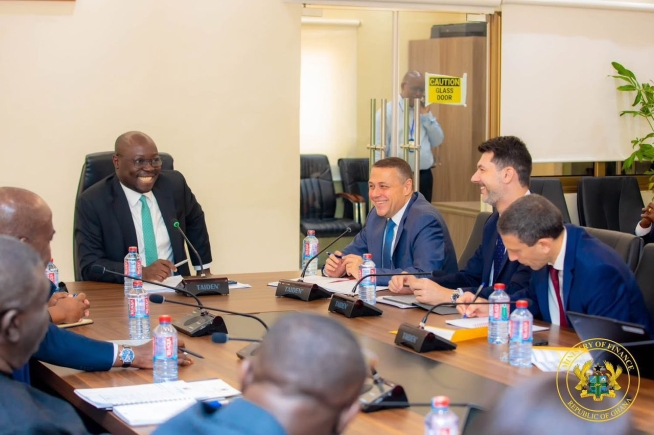The International Monetary Fund (IMF) has reached a staff-level agreement with Ghanaian authorities regarding the fifth review of the country's economic programme to unlock $385 million in financial support under the Extended Credit Facility (ECF).
The agreement — which still awaits approval from IMF Management and consideration by the Executive Board — follows discussions in Accra between September 29 and October 10, 2025, involving an IMF mission team led by Ruben Atoyan and Ghanaian officials.
Once the Executive Board completes its review, Ghana will gain access to approximately $385 million, raising the total disbursements received under the three-year Extended Credit Facility arrangement to about $2.825 billion since its inception in May 2023.
IMF staff met with Ghana’s Minister of Finance, Dr Cassiel Ato Forson; the Governor of the Bank of Ghana (BoG), Dr Johnson Pandit Asiama, and their teams, as well as representatives from various government agencies and other stakeholders.
A statement issued in Accra by the IMF last Friday said: “Ghana’s economy is gaining momentum, with stronger growth and single-digit inflation for the first time since 2021.
Robust exports and rising international reserves have boosted the cedi.
These gains reflect sustained reforms, a favourable external environment, and improved investor confidence”.
It said the authorities were making progress on debt restructuring, fiscal consolidation, energy sector reforms, foreign exchange operations, and financial sector resilience.
Strong growth
Mr Atoyan, in the statement, explained that “macroeconomic stabilisation is taking root. Growth in 2025 first half was stronger than anticipated, underpinned by strong services activity and agricultural output.
“The external sector has improved noticeably on robust exports — particularly gold and cocoa. International reserves accumulation continues to exceed the ECF-supported programme targets, while the cedi appreciated markedly in the first half of the year,” he added.
He said the positive momentum was expected to continue into 2026, with growth projected at 4.8 per cent.
He added that inflation was forecasted to remain within the Bank of Ghana’s target band of between 6.0 per cent and 10 per cent, allowing for gradual monetary policy normalisation.
Mr Atoyan explained that a solid current account surplus would continue to aid reserves accumulation, although external risks remained significant, largely on account of lingering uncertainty of commodity prices for Ghana’s key exports.
“The authorities made notable strides in addressing long-standing challenges in the energy sector.
The government has renegotiated legacy arrears and power purchasing agreements with most independent power producers.
“Tariff adjustments are now conducted quarterly, helping to better reflect costs. Payments through the Cash Waterfall Mechanism have also increased significantly,” he said.
Fiscal front
Furthermore, the statement referenced Mr Atoyan as saying that on the fiscal front, the primary balance for the first eight months of 2025 posted a surplus of 1.1 per cent of GDP, on track to achieve the 1.5 per cent of GDP target by year-end.
He said the authorities were committed to adopting a 2026 Budget, targeting a 1.5 per cent of GDP primary surplus on a commitment basis, in line with the recently adopted Fiscal Responsibility Framework.
“Discussions with the authorities also centred on structural fiscal reforms to support fiscal adjustment and entrench discipline, boost domestic revenues, strengthen public financial and public investment management systems, and bolster the credibility of Ghana’s fiscal framework.
“The comprehensive debt restructuring is progressing well. Following the signing of a Memorandum of Understanding with the Official Creditor Committee under the G20 Common Framework, bilateral agreements have been concluded with five countries.
“The authorities are actively engaging in negotiations with remaining commercial creditors to finalise debt treatments. Moreover, Ghana’s debt trajectory improved markedly on an upgraded macroeconomic outlook and continued fiscal discipline, a significant step toward Ghana's long-term debt viability,” Mr Atoyan added.
Inflation falling
Mr Atoyan explained that with inflation falling towards its target band, the Bank of Ghana had embarked on an easing cycle, cutting the policy rate by a cumulative 650 basis points to 21.5 per cent.
He said the prudent monetary policy was expected to help re-anchor inflation expectations.
In collaboration with the fund, he said the BoG had developed a structured foreign exchange operations framework to intermediate foreign exchange flows and smooth excessive market volatility, while accumulating international reserves.
“The authorities have taken strong actions to support financial stability, including implementing the strategy to restructure and reform state-owned banks, addressing gaps in the crisis management and resolution framework, and implementing a multi-pronged strategy to address non-performing loans.
The recapitalisation of state-owned banks is expected to be completed by end-2025,” the statement said.
